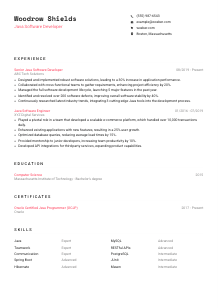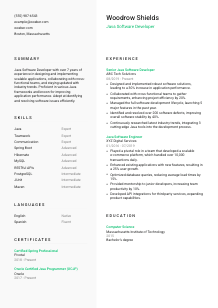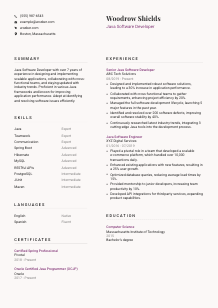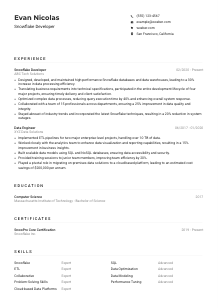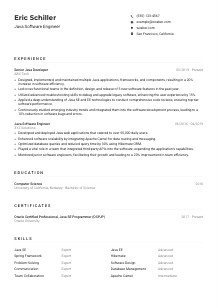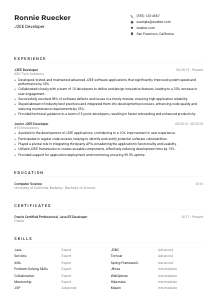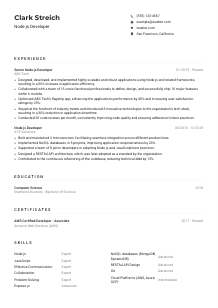Java Software Developer Resume Example
Navigating arrays and objects, but your resume is not compiling correctly? Explore this Java Software Developer resume example, debugged with Wozber free resume builder. Discover how to thread your programming skills through the job requirements, building a career as robust and versatile as your code!
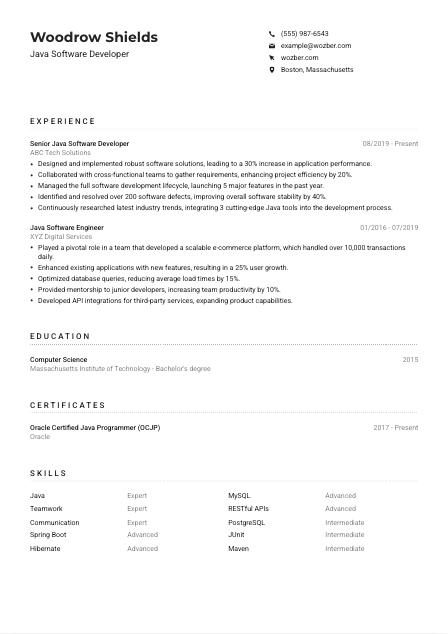
How to write a Java Software Developer resume?
Hello, aspiring Java Software Developer! Ready to jump-start your career with a resume that not only meets the mark but surpasses all expectations? Today, we're diving deep into the art of resume crafting, specifically tailored for you. Using Wozber's free resume builder, we'll guide you through each step, ensuring your resume isn't just seen but remembered.
From leveraging an ATS-friendly resume template to optimizing with an ATS resume scanner, we're here to elevate your resume. Ready to compile your skills, experiences, and achievements into a standout resume? Let's get coding!
Personal Details
The 'Personal Details' section is your digital handshake. It might look simple, but it's where first impressions are formed. Let's align this section with your future Java Software Developer role, ensuring precision and a professional touch.
1. Your Name as Your Brand
Think of your name as the class name in every Java program you write – it's essential. Ensure it's in a clear, readable font, setting the stage for the entire resume. Just like choosing the right variable names, clarity and readability are key.
2. Job Title Precision
Below your name, include the job title you're aspiring for, 'Java Software Developer,' just as you would declare your intentions at the start of your Java program. This unmistakable clarity ensures the ATS recognizes your target role instantly.
3. Contact Info: Keep it Error-Free
Your phone number and email should be your primary methods of contact. Double-check them like you would your code, ensuring there are no bugs (or typos) that could prevent a potential employer from reaching out.
4. Location Match
The job description calls for candidates located in Boston, Massachusetts. Make sure to emphasize your Boston location in your contact details, making it clear there will be no relocation delays.
5. Add a Professional Link
Including a link to a professional profile or personal website, like GitHub, can significantly enhance your resume. Here, you're providing a repository of your work, akin to showing your portfolio of coding projects.
Takeaway
This section is akin to your 'public static void main(String[] args)' – it starts the conversation. Precision, clarity, and alignment with the Java Software Developer role are critical.





Experience
In the Java universe, your experience section is where you showcase your 'class' files – the backbone of your applications. Here's how to construct an experience section that demonstrates your programming prowess and alignment with the role's requirements.
- Designed and implemented robust software solutions, leading to a 30% increase in application performance.
- Collaborated with cross‑functional teams to gather requirements, enhancing project efficiency by 20%.
- Managed the full software development lifecycle, launching 5 major features in the past year.
- Identified and resolved over 200 software defects, improving overall software stability by 40%.
- Continuously researched latest industry trends, integrating 3 cutting‑edge Java tools into the development process.
- Played a pivotal role in a team that developed a scalable e‑commerce platform, which handled over 10,000 transactions daily.
- Enhanced existing applications with new features, resulting in a 25% user growth.
- Optimized database queries, reducing average load times by 15%.
- Provided mentorship to junior developers, increasing team productivity by 10%.
- Developed API integrations for third‑party services, expanding product capabilities.
1. Listing Relevant Roles
Begin by breaking down the job description and identifying the experiences that directly align with the requirements. For Java Developers, emphasizing roles where you've utilized Java frameworks, like Spring Boot and Hibernate, is key.
2. Highlighting Accomplishments
For each role, craft bullet points that demonstrate not just what you did, but the impact of your work. For example, 'Collaborated with cross-functional teams to gather requirements, enhancing project efficiency by 20%.'
3. Quantify Your Impact
Wherever possible, use numbers to quantify your achievements. 'Optimized database queries in MySQL, reducing average load times by 15%.' Just like in performance tuning, numbers show the effectiveness of your solutions.
4. Tailor Your Tech Stack
Make sure to tailor your experience to the job's required tech stack. Mention specific Java technologies mentioned in the job description, showcasing your direct experience and expertise in these areas.
5. Focus on Collaboration and Resolution
Emphasize your ability to work within a team and solve problems, as mentioned in the job description. Highlighting instances where you've collaborated or led a team through a challenging technical problem can be particularly effective.
Takeaway
Your experience section is a testament to your coding journey. Tailor it to the role, quantify your achievements, and above all, let your passion for Java development shine through.
Education
In your journey as a Java Software Developer, your education lays the foundational 'class structure.' Let's detail how to construct an education section that emulates the key requirements for the role.
1. Degree Alignment
Start with the cornerstone of your educational background – your degree. Listing your Bachelor's degree in Computer Science or a related field directly aligns with the job's requirements. It's the 'public class' declaration of your resume.
2. Highlight Your Institution
Mention the name of the institution, like 'Massachusetts Institute of Technology,' to add credibility and context to your educational background, akin to importing a robust library in your project.
3. Graduation Date
Including the graduation date gives the employer a timeframe of your academic tenure. Think of it as a timestamp in your code, offering clarity on when a module was completed.
4. Relevant Courses & Projects
If you're early in your career, consider listing relevant courses or projects that showcase your Java expertise – it's like showing off your understanding of essential APIs within the Java ecosystem.
5. Academic Achievements
Any honors or distinctions can further bolster your educational section, demonstrating your dedication and excellence in your field. It's the 'exception handling' that shows you can navigate challenges with grace.
Takeaway
Your education section is the foundation upon which your coding career is built. Ensure it aligns with the Java Developer role, laying a solid groundwork for your professional achievements.
Certificates
In the ever-evolving world of Java development, certificates are like badges of honor – tangible proof of your ongoing education and specialization. Here's how to highlight them effectively.
1. Selecting Relevant Certifications
Choose certifications that are directly relevant to the Java Software Developer role. For example, 'Oracle Certified Java Programmer (OCJP)' and 'Certified Spring Professional' directly reflect the skills sought in the job description.
2. Transparency with Dates
Be clear about the validity of your certifications. If they have an expiration date, include the date to show your credentials are current, much like ensuring your software dependencies are up to date.
3. Prioritize Pertinence over Quantity
While it's tempting to list every certification, prioritize those most relevant to Java development. It's akin to importing only the necessary libraries in your project – keep it lean and efficient.
4. Continuous Learning
Highlight any recent or in-progress certifications to show your commitment to continuous learning, mirroring the fast-paced evolution of Java technology and frameworks.
Takeaway
Certificates augment your resume by showcasing a commitment to your craft and specialization in Java development. Select and present them thoughtfully, ensuring they add value to your professional narrative.
Skills
The 'Skills' section is your resume's function declaration, outlining your capabilities and expertise. Matching your skills with the job requirements is crucial for passing the ATS and impressing the hiring manager.
1. Match Job Description Keywords
Scan the job description for keywords and phrases. Listing skills like 'Java,' 'Spring Boot,' 'Hibernate,' and 'MySQL' directly aligns with technical requirements, ensuring your resume speaks the language of the job posting.
2. Highlight Both Hard and Soft Skills
While technical expertise is essential, don't forget to showcase soft skills. Mentioning 'solid interpersonal and communication skills' aligns with the job's emphasis on teamwork and effective communication within a team environment.
3. Keep It Organized and Relevant
Organize your skills in a way that emphasizes your strengths clearly. Like clean, efficient code, your skills section should be readable at a glance, presenting a streamlined snapshot of your expertise.
Takeaway
In the high-stakes world of software development, your skills section is your competitive edge. Tailor it to the role, ensuring every line of this 'code' resonates with the job description and highlights your qualifications as a Java Software Developer.
Languages
While coding languages are your main dialect, proficiency in spoken languages can also be a significant asset, especially in diverse and global teams. Let's code your languages section with the same precision.
1. Mandatory Proficiency
Given the job requirement for 'ability to perform job duties in English is essential,' ensure English is listed and marked as 'Native' or 'Fluent.' It's the primary 'programming language' for this role.
2. Additional Languages
If you speak other languages, list them to demonstrate your versatility. For a Java Developer, this could parallel your ability to work with different APIs or frameworks, showcasing adaptability.
3. Honest Proficiency Levels
Be honest about your proficiency levels. Whether it's 'Fluent' or 'Basic,' clarity is key, akin to commenting your code for clarity – it aids understanding and sets expectations.
4. Consider the Company Culture
If the company values diversity or operates globally, stress your linguistic capabilities. It's like illustrating your versatility with various programming paradigms or environments in your portfolio.
5. Emphasize Communication Skills
In global or remote teams, effective communication can be as crucial as technical skills. Highlighting your ability to communicate in multiple languages can underscore your effectiveness in collaborative projects.
Takeaway
Your ability to communicate in multiple languages can significantly enhance your appeal as a Java Software Developer candidate. It symbolizes your flexibility, adaptability, and readiness for global engagement.
Summary
The summary is the documentation at the top of your code – it tells others at a glance what to expect. In resume terms, it's your chance to encapsulate your essence as a Java Software Developer.
1. Reflect the Job Essence
Begin by reviewing the job requirements and inject that essence into your summary. Mention 'over 7 years of experience in designing and implementing scalable applications using Java technologies,' aligning with the demand for experienced candidates.
2. Highlight Specialized Skills
Put forward the skills that set you apart, such as proficiency in specific frameworks 'like Spring Boot and Hibernate' or tools demanded by the job. It's like pointing out the unique features of your program.
3. Emphasize Key Achievements
Mention achievements that would resonate with the hiring manager, such as 'leading to a 30% increase in application performance' or 'resolving over 200 software defects,' to showcase your impact.
4. Keep It Concise and Powerful
Aim for a summary that's efficient and impactful, much like well-written code. It should invite the reader to learn more about you, setting the stage for the 'deep dive' into the details of your resume.
Takeaway
Your summary is more than an introduction; it's your pitch, your hook, your declaration of value as a Java Software Developer. Tailor it to catch the hiring manager's eye and echo the job requirements, showcasing why you're the perfect function call for this role.
Launching Your Java Software Developer Journey
Congratulations, you've reached the end of this guide, but your journey as a Java Software Developer is just beginning. Armed with your newly crafted resume, you're ready to catch the attention of hiring managers. Remember, each section of your resume is like a piece of your code – it needs to be clean, efficient, and tailored to the task at hand.
Use Wozber's ATS-friendly resume template and free resume builder, including its ATS resume scanner for optimal ATS optimization. Your professional journey awaits – let's make your resume the key to unlocking new opportunities.

- Bachelor's degree in Computer Science, Software Engineering or a related field.
- Minimum of 3 years of professional experience in Java development.
- Strong expertise in Java frameworks like Spring Boot and Hibernate.
- Proficiency in working with relational databases, especially MySQL or PostgreSQL.
- Solid interpersonal and communication skills with the ability to work both independently and within a collaborative team environment.
- Ability to perform job duties in English is essential.
- Must be located in Boston, Massachusetts.
- Design and implement scalable and robust software solutions using Java technologies.
- Collaborate closely with cross-functional teams to gather and understand software requirements.
- Participate in the full software development lifecycle, from design to deployment.
- Identify, troubleshoot, and resolve software defects and issues in a timely manner.
- Stay up-to-date with the latest industry trends, tools, and best practices to continuously improve software quality and functionality.





